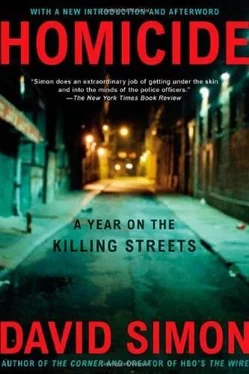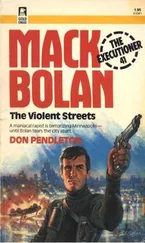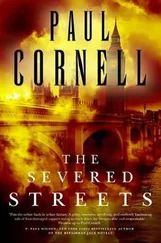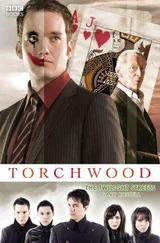“I don’t remember.”
“You don’t remember?”
“No.”
“Do you remember telling the grand jury what he was wearing?”
“Objection, your honor,” says Polansky.
Gordy overrules him. “Yes or no?” says the judge.
“They might have asked me,” she says bitterly. “I don’t remember.”
And so it goes for half an hour, with Doan reading from the transcripts and Sharon Henson claiming to remember nothing.
“Isn’t it true, ma’am, that during the course of the party you had an argument with Mr. Frazier?”
“Yes.”
“And after the argument he left your apartment?”
“No.”
“He never left your apartment?”
“He left for about twenty minutes, yes.”
“And when he came back, what did he do?”
“He continued to mingle with the guests.”
“And he stayed the whole night. This is what you are telling the ladies and gentlemen of the jury?”
“Yeah,” she says.
“And you want them to believe that, right?”
Polansky is on his feet with the objection.
“Overruled,” says Gordy.
At which point Sharon Henson looks across the courtroom at Larry Doan and smiles sweetly. It’s as if she actually believes she’s destroying the state’s case; in fact, she is turning all of Paul Polansky’s lawyering to dust.
“Is that right, ma’am?” asks Doan. “You want them to believe that he stayed the whole night with you. Is that right?”
“Well he did.”
“Is your memory of the events of the twenty-second of February clearer today than it would have been on March seventeenth or March tenth of this year?”
“March? No. Yes.”
“Is it clearer today?” says Doan, showing his irritation.
“I mean, I have talked it over with the people that was at the party.”
Doan looks at the jury, giving them an honest-to-God double take. “Okay,” he says, shaking his head. “You talked to some people at the party, and that made your recollections clearer?”
“It made me see a few more things about that night that I didn’t see that night or whatever.”
“You mean like how long your boyfriend stayed at your apartment? You needed someone else to tell you how long your boyfriend stayed at your apartment?”
“Excuse me, sir,” hisses the woman. “I was under the influence of drugs and alcohol that night.”
“So how,” asks Doan, saying each word slowly, “do you remember it now?”
At the defense table, Polansky sits with his hand to his forehead, presumably thinking about the case that might have been. Subtle strategies have suddenly been rendered obsolete by simple vaudeville. The Newport cigarettes, the unchecked hairs and the ghost of Vincent Booker-all of that is out the window now that Doan is blowing holes in Sharon Henson for the courtroom’s amusement. At times, the jurors laugh so loudly that Gordy uses the gavel.
Outside the courtroom, Rich Garvey fidgets as Henson’s time on the stand lengthens. Only when Doan emerges is the true scope of the victory made clear to him.
“What happened with Nee-Cee?” he asks the prosecutor as they walk down the third-floor corridor. “How’d she go over?”
Doan smiles as if he had a dorsal fin sticking through the back of his pinstripes. “I killed her. I destroyed her,” he tells the detective. “There’s blood all over the floor in there.”
“She was terrible?”
“She was a fucking joke. The jury was laughing at her,” says Doan, unable to conceal his delight. “I’m serious. I fucking murdered her.”
From here forward, it is a downhill ride. If Sharon Henson had held to the truth, if she had been willing to give the state what she gave them in March, she could have counted herself as nothing worse than one piece of the circumstantial puzzle. Instead, she chose to perjure herself and as a result, she exists in every juror’s mind as evidence of Robert Frazier’s desperation.
On Monday, the testimony begins again with Rich Garvey’s return to the stand and the blow-by-blow of the investigative steps that led to Frazier’s arrest. On the cross-examination, Polansky works hard to emphasize his client’s early cooperation in the probe, Frazier’s willingness to come downtown and be interviewed without a lawyer. At one particularly telling moment, Polansky asks about the wounds from both knife and gun, suggesting that the use of two weapons indicates that two suspects are involved.
“How many years have you been a police officer?” he asks Garvey.
“Thirteen.”
“And you’ve investigated many, many homicide cases either directly or-”
“That’s right,” says Garvey.
“Have you ever had a case where the victim died by a stab wound and gun wound and there was only one perpetrator?” asks Polansky.
“Yes,” says Garvey calmly.
“How many cases? What case? Name it.”
“We had indications in the case of Purnell Booker that there was one perpetrator.”
Take that, thinks Garvey. With one sweet little answer, the same jury that has been asked to worry about the mysterious Vincent Booker can now wonder about the fact that somewhere in this case another Booker exists as a victim. Polansky asks to approach the bench.
“I am not even sure what to do, whether to ask for a mistrial or not,” he tells Gordy.
The judge smiles, shaking his head. “You’re not going to do anything since you asked him.”
“I didn’t ask him,” Polansky protests.
“He answered your question,” says Gordy. “What is your request? What do you want me to do? Why did you come up here?”
“I don’t know,” says Polansky. “Now I’m wondering whether I should open the whole thing.”
“I’m not going to let him open up the whole can of worms based on that answer.”
“Thank you,” says Polansky, still a little dazed. “I am not… I have no requests then.”
Garvey’s second trip to the stand is a carefully crafted piece of work and a redemption of sorts for his performance on the first day of the trial, but it is almost beside the point. So, too, is the testimony of Robert Frazier, who takes the stand the following day to explain himself to the jury and declare that he had no reason or desire to kill Charlene Lucas. Frazier’s day in court has already been clouded by Sharon Henson; she has colored everything to which the jury is subsequently exposed. More than that, Henson’s testimony provided a stark contrast to the other essential testimony in the case: Romaine Jackson was young and frightened and reluctant when she identified Robert Frazier as the man she saw with Lena on the night of the murder; Sharon Henson was hard and bitter and contemptuous when she took the same stand to deny her own words.
That is precisely the comparison that Doan makes in his closing argument to the jury. Rich Garvey, now permitted in the courtroom as an observer, watches several jurors nod in agreement as Doan paints a vivid picture of each woman-one is an innocent truth-teller, the other, a corrupt prevaricator. Once again he returns to Henson’s testimony about her boyfriend’s clothing. He gives special attention to one small piece of testimony, one tiny fragment gleaned from a week of legal argument. When Romaine Jackson testified, she was asked to describe the defendant’s hat. A cap, she says, a white cap.
“She’s got her hands up here and she says it has a snap on it,” recalls Doan, hands to his head. “Has a snap on it… And when did that become significant?”
Sharon Henson, he tells the jury. A day later, Sharon Henson is on the stand trying to help her boyfriend. Oh, says Doan, in imitation, he was wearing all beige. Beige trench coat. Beige slacks. Beige shoes. Probably beige underwear and a beige golf cap…
Читать дальше












